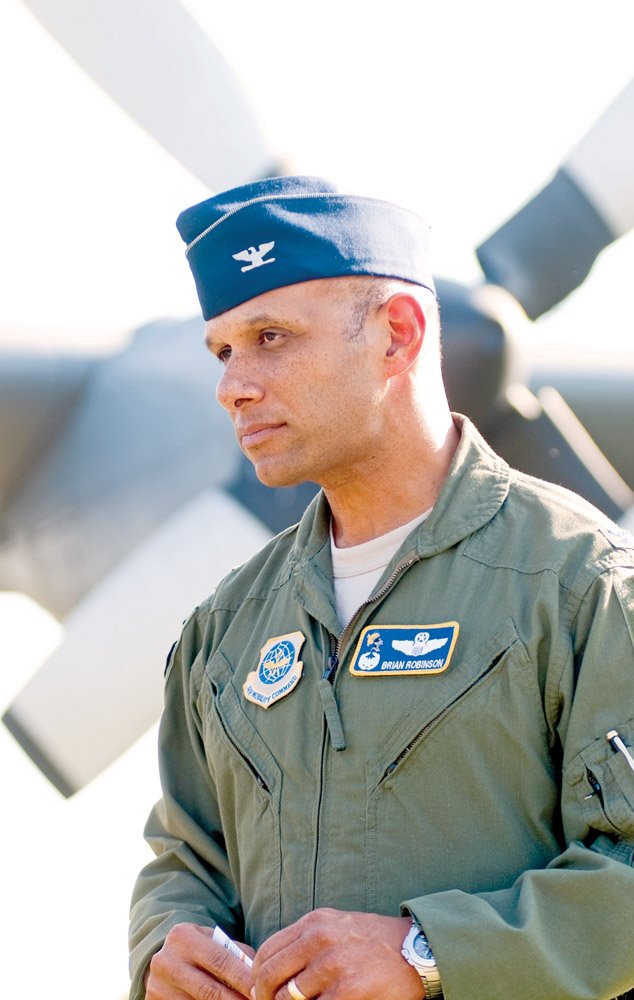Col. Brian Robinson loves to fly.
He said aviation was his boyhood dream. The 46-year-old not only grew up to fly, but he soared up the Air Force ladder to become commander of the 19th Airlift Wing at Little Rock Air Force Base in January. Before coming to Little Rock this time, Robinson was executive officer to the commander, Air Mobility Command, Scott Air Force Base, Ill.
Although Robinson is a new commander at LRAFB, he isn’t unfamiliar with the base .
“This is my fourth time at Little Rock,” he said as he took a seat at a long conference table in his office at the base. “When I was assigned to fly C-130s, I did my training in Little Rock.”
Robinson’s father was in the Army for more than 24 years, but it was a neighbor who got Robinson interested in the Air Force.
“A neighbor down the street got into the Air Force Academy. I was about four years his junior,” Robinson said. “I looked up to him, and he planted the seed. … I was blessed and fortunate to get into officer training school in August 1987.”
He had worked his way through college and graduated in 1987 with not only a Bachelor of Science degree in computer science from Philadelphia University, but also with substantial debt.
He knew the flight program would be difficult, and at that time, Robinson had never been up in a plane.
“I rented some air time in a Cessna to make sure I didn’t get airsick,” the colonel said with a laugh. “I knew it was an all-or-nothing step.”
So Robinson took on the challenge of Officer Training School and went into the 52-week-long pilot-training program. After he completed that, he was chosen to instruct pilots to fly the T-38, a twin-engine, high-altitude supersonic jet trainer used in a variety of roles.
He said he enjoyed teaching, but it was a challenge to make sure his class graduated on time.
As a leader, Robinson said, he believes he should always be humble, credible and approachable. He also said a good leader knows his craft, and he should admit when he’s wrong.”
“I serve the airmen who are doing the hard work,” he said. “I make sure they have what they need.”
He did say that the downside to being a senior leader is that many times people won’t give him the “straight skinny.” But he said it’s difficult to make good decisions without knowing everything.
“Without accurate facts, you’ll make a poor decision,” he said. “People need to feel confident to come to you and tell you what’s going on.”
He said he believes in empowering people at their levels and allowing them to make decisions and trusting them to do their jobs. And, he said, he’s not afraid to say he made a mistake if he makes the wrong decision, and he wants people to feel comfortable enough to come to him and tell him what’s going on.
“We couldn’t have asked for a better leader to lead the men and women of 19th Airlift Wing,” Chief Master Sgt. Margarita Overton, 19th Airlift Wing, wrote in an email. “Col. Robinson is the epitome of a servant leader in that he is able to inspire people toward safe and effective mission execution by encouraging innovative ideas and fostering critical thinking. In today’s resource-constrained environment, we need to be assured our leaders are listening and addressing our most critical concerns. Col. Robinson demonstrates he is that type of leader.”
Robinson has had many successes in his military career, and he said one of the accomplishments of which he’s most proud is working as part of Iraqi Freedom for Air Mobility Command.
Vice President Dick Cheney pinned the Bronze Star on Robinson during a ceremony at McChord Air Force Base, near Tacoma, Washington. He and other airmen and soldiers received medals for their heroic actions during major combat operations in Iraq.
He also participated in Operation Deep Freeze, in which Robinson landed a C-130 on a sea-ice runway in Antarctica, where several National Science Foundation scientists were working. Robinson said he would land the C-130, which had a full weight of 580,000 pounds, on a landing strip that was nothing more than a frozen strip of ice over the sea.
“When there would be an early spring, the ice would begin to thin,” he said. “Sometimes I could see a bubble of water underneath the runway as I was landing.”
Robinson said he’s a pretty private person, and that’s why he winced a little bit when he was asked about his nickname, “Smokey.” Many people who know Robinson call him Smokey, and of course, there’s a story behind the name that many people don’t know.
He said that twice within a five-week span, as he was piloting a C-130 over the Pacific Ocean, there was an electrical fire in the cockpit.
“Smoke filled the cockpit, and we are over the ocean, and there’s no place to land,” he said, then laughed. “We were eating box lunches, and I threw my lunch over my shoulder into the master flight engineer’s face.”
Robinson is a command pilot and USAF weapons officer with more than 4,300 hours in airlift and trainer aircraft. Although he’s the base commander now, he said he still likes to fly once a week.
Staff writer Jeanni Brosius can be reached at (501) 244-4307 or jbrosius@arkansasonline.com.
